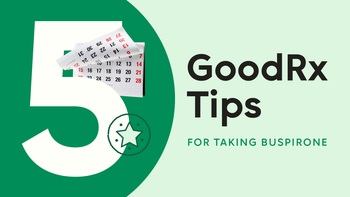
buspirone
Buspirone is used to relieve anxiety, but it's not a first-choice medication. Your provider might consider adding on buspirone if your anxiety symptoms aren't well-controlled by other medications. It's taken by mouth, typically twice daily. Unlike some other anti-anxiety medications, it's not a controlled substance. Some common side effects of buspirone include dizziness, nausea, headache, and nervousness. The brand name Buspar is no longer available.

What is Buspirone?
What is Buspirone used for?
Anxiety
How Buspirone works
Buspirone is an antianxiety medication. It's unclear how buspirone works, but it seems to affect chemicals in the brain that control mood and anxiety.
Drug Facts
More on Buspirone essentials

Get your GoodRx coupon

What are the side effects of Buspirone?
Common Side Effects
- Dizziness (12%)
- Drowsiness (10%)
- Nausea (8%)
- Headache (6%)
- Nervousness (5%)
Other Side Effects
- Feeling tired
- Dry mouth
- Trouble sleeping
- Lightheadedness
Serious Side Effects
- Serotonin syndrome: fast heart rate, fever, dizziness, sweating, shakiness, muscle stiffness, uncoordinated movement, seizures, hallucinations, coma
Source: DailyMed
More on Buspirone side effects
The following side effects have also been reported
Along with its needed effects, a medicine may cause some unwanted effects. Although not all of these side effects may occur, if they do occur they may need medical attention.
Check with your doctor immediately if any of the following side effects occur:
Rare
confusion
fast or pounding heartbeat
incoordination
mental depression
muscle weakness
numbness, tingling, pain, or weakness in the hands or feet
skin rash or hives
stiffness of the arms or legs
uncontrolled movements of the body
Get emergency help immediately if any of the following symptoms of overdose occur:
Symptoms of overdose
Dizziness or lightheadedness especially when getting up from a sitting or lying position suddenly
drowsiness (severe)
loss of consciousness
nausea or vomiting
stomach upset
very small pupils of the eyes
Some side effects may occur that usually do not need medical attention. These side effects may go away during treatment as your body adjusts to the medicine. Also, your health care professional may be able to tell you about ways to prevent or reduce some of these side effects. Check with your health care professional if any of the following side effects continue or are bothersome or if you have any questions about them:
More common
Restlessness, nervousness, or unusual excitement
Less common or rare
Blurred vision
clamminess or sweating
decreased concentration
drowsiness
dryness of the mouth
muscle pain, spasms, cramps, or stiffness
ringing in the ears
trouble with sleeping, nightmares, or vivid dreams
unusual tiredness or weakness
Other side effects not listed may also occur in some patients. If you notice any other effects, check with your healthcare professional.
Call your doctor for medical advice about side effects. You may report side effects to the FDA at 1-800-FDA-1088.

Pros and cons of Buspirone

Pros
Much lower risk for dependency and withdrawal symptoms than other anti-anxiety medications
Taken by mouth
Can be taken by children as young as 6 years old
Can cut tablets if needed
Available as a lower-cost generic

Cons
Not a first-choice treatment option for anxiety
Not for quick relief of anxiety or panic attacks
Can take a few weeks to fully kick in
Typically taken twice a day
Interacts with many medications and grapefruit juice

Pharmacist tips for Buspirone

Food affects how your body absorbs buspirone. It's best to be consistent with food when taking your dose. Either always take buspirone with food or always take it without food.
Avoid drinking large amounts of grapefruit juice while taking buspirone. Grapefruit juice causes buspirone to build up in your body to high levels. This makes you more likely to experience side effects, such as dizziness and drowsiness.
Buspirone can make you drowsy or dizzy, especially when you first start it or when your provider raises your dose. Don't drive or operate heavy machinery until you know how this medication affects you.
It's best to avoid alcohol when taking buspirone. This medication can cause drowsiness or dizziness, and alcohol can worsen these side effects.
Buspirone interacts with many medications. Talk with your healthcare provider or pharmacist before starting buspirone, so they can check for interactions. Be sure to tell them about all medications you take, including over-the-counter medications, herbals, and vitamins.
Tell your provider if you're breastfeeding, since buspirone can pass into breast milk and potentially cause harm to your baby.
More on Buspirone tips

Frequently asked questions about Buspirone

How to save using GoodRx




What are the risks and warnings for Buspirone?
Buspirone can cause some serious health issues. This risk may be even higher for certain groups. If this worries you, talk to your doctor or pharmacist about other options.

Serotonin syndrome
Risk factors: Taking other medications that can affect the serotonin levels in your brain
Serotonin syndrome is a rare, but potentially life-threatening condition where there's too much serotonin in the brain. Serotonin is one of the chemicals in your brain that's responsible for your mood. Your risk goes up if you take buspirone with other medications that raise serotonin levels, such as certain antidepressants, migraine medications, and pain medications. Tell your pharmacist about all medications and over-the-counter products you take before starting buspirone so they can check for any interactions. Get medical help right away if you experience symptoms of too much serotonin including a fast heart rate, sweating, muscle stiffness or spasms, fever, and confusion.

Effect on driving and concentration
Risk factors: Drinking alcohol | Taking other medications that cause drowsiness
Buspirone can cause some people to feel more sleepy and others to feel more awake. Because its side effects on your ability to concentrate can be unpredictable, avoid activities that require you to be alert (like driving or operating machinery) until you know how buspirone affects you.

Withdrawal symptoms from stopping other anxiety medications
Risk factors: Stopping benzodiazepines or hypnotics suddenly
If you're switching from a benzodiazepine to buspirone, make sure to work closely with your provider to lower your dose of the benzodiazepine slowly over time. Because buspirone works differently than benzodiazepine, it won't help prevent benzodiazepine withdrawal symptoms that you might experience from stopping benzodiazepine too suddenly. Let your provider know if you experience any withdrawal symptoms, such as nausea, vomiting, diarrhea, and headache.

Don't take with monoamine oxidase inhibitors (MAOIs)
Risk factors: Taking buspirone with MAOIs | Taking buspirone within 14 days of stopping MAOIs | Taking MAOIs within 14 days of stopping buspirone
Taking buspirone and a monoamine oxidase inhibitor (MAOI) can lead to dangerously high blood pressures so these medications shouldn't be taken together. Since both buspirone and MAOIs stay in your system for some time, you should wait at least 14 days after stopping one medication to begin the other. Be sure to tell your healthcare provider and pharmacist about all medications you take before starting buspirone.

Buspirone dosage forms
Typical dosing for Buspirone
The typical starting dose of buspirone is 7.5 mg by mouth twice daily. Your provider might raise your dose every few days depending on how you respond to the medication. The maximum dose is 60 mg daily.
More on Buspirone dosage forms

Interactions between Buspirone and other drugs
More on Buspirone interactions
Using this medicine with any of the following medicines is not recommended. Your doctor may decide not to treat you with this medication or change some of the other medicines you take.
- Isocarboxazid
- Linezolid
- Phenelzine
- Tranylcypromine
Using this medicine with any of the following medicines is usually not recommended, but may be required in some cases. If both medicines are prescribed together, your doctor may change the dose or how often you use one or both of the medicines.
- Alfentanil
- Almotriptan
- Alprazolam
- Amitriptyline
- Amoxapine
- Amphetamine
- Benzhydrocodone
- Benzphetamine
- Bromazepam
- Bromopride
- Buprenorphine
- Butorphanol
- Calcium Oxybate
- Cannabidiol
- Carbinoxamine
- Ceritinib
- Cetirizine
- Clorgyline
- Clozapine
- Cobicistat
- Codeine
- Conivaptan
- Desvenlafaxine
- Dextroamphetamine
- Dihydrocodeine
- Dolasetron
- Doxylamine
- Duloxetine
- Duvelisib
- Escitalopram
- Esketamine
- Fenfluramine
- Fentanyl
- Flibanserin
- Fosnetupitant
- Gabapentin
- Gabapentin Enacarbil
- Granisetron
- Hydrocodone
- Hydromorphone
- Hydroxytryptophan
- Idelalisib
- Iproniazid
- Ivosidenib
- Ketamine
- Larotrectinib
- Lasmiditan
- Lefamulin
- Lemborexant
- Levocetirizine
- Levomilnacipran
- Levorphanol
- Lisdexamfetamine
- Lithium
- Lofexidine
- Lorcaserin
- Lorlatinib
- Loxapine
- Lumacaftor
- Magnesium Oxybate
- Meclizine
- Meperidine
- Metaxalone
- Methadone
- Methamphetamine
- Methylene Blue
- Metoclopramide
- Midazolam
- Mirtazapine
- Moclobemide
- Morphine
- Morphine Sulfate Liposome
- Nalbuphine
- Netupitant
- Nialamide
- Ondansetron
- Oxycodone
- Oxymorphone
- Palonosetron
- Pargyline
- Paroxetine
- Pentazocine
- Periciazine
- Potassium Oxybate
- Pregabalin
- Procarbazine
- Remifentanil
- Remimazolam
- Scopolamine
- Selegiline
- Sertraline
- Sodium Oxybate
- Sufentanil
- Tapentadol
- Toloxatone
- Tramadol
- Trazodone
- Vilazodone
- Vortioxetine
- Ziprasidone
- Zolpidem
Using this medicine with any of the following medicines may cause an increased risk of certain side effects, but using both drugs may be the best treatment for you. If both medicines are prescribed together, your doctor may change the dose or how often you use one or both of the medicines.

How much does Buspirone cost?

Buspirone contraindications
Currently take monoamine oxidase inhibitors (MAOIs) or have taken an MAOI within the past 14 days

What are alternatives to Buspirone?
Depression in people ages 12 years and older
Generalized anxiety disorder (GAD) in people ages 7 years and older
Itching from allergic skin conditions (e.g., hives, eczema, etc.)
Sleep aid (sedative) while receiving general anesthesia for surgery

What is the latest news about Buspirone?

Buspirone images
Get savings updates for Buspirone
Receive price alerts, news, and other messages from GoodRx about Buspirone and other healthcare topics and relevant savings offers.By signing up, I agree to GoodRx's Terms and Privacy Policy, and to receive marketing messages from GoodRx.
References
Best studies we foundAdvagen Pharma Ltd. (2023). BUSPIRONE HCL- buspirone hydrochloride tablet [package insert]. DailyMed.
Anxiety & Depression Association of America. (2016). Clinical practice review for GAD.
Dent, R., et al. (2012). Changes in body weight and psychotropic drugs: A systematic synthesis of the literature. PLoS One.
Drugs and Lactation Database (LactMed). (2022). Buspirone. National Institute of Child Health and Human Development.
Jann, M.W. (1988). Buspirone: An update on a unique anxiolytic agent. Pharmacotherapy.
Rakel, R. E. (1990). Long-term buspirone therapy for chronic anxiety: A multicenter international study to determine safety. Southern Medical Journal.
Wilson, T. K., et al. (2023). Buspirone. StatPearls.
Compare other Anxiety drugs
Browse medications
View AllResearch prescriptions and over-the-counter medications from A to Z, compare drug prices, and start saving.



















